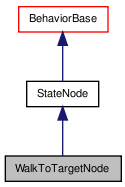WalkToTargetNode Class Reference
a state node for walking towards a visual target More...
#include <WalkToTargetNode.h>

Detailed Description
a state node for walking towards a visual target
Definition at line 9 of file WalkToTargetNode.h.
Public Member Functions | |
| WalkToTargetNode (unsigned int obj) | |
| constructor, pass VisionObjectSourceID_t | |
| WalkToTargetNode (const std::string &nodename, unsigned int obj) | |
| constructor, pass instance name and VisionObjectSourceID_t | |
| virtual std::string | getDescription () const |
| Gives a short description of what this particular instantiation does (in case a more specific description is needed on an individual basis). | |
| virtual Transition * | newDefaultLostTrans (StateNode *dest) |
| returns a suggested transition for detecting "lost" condition, but you don't have to use it | |
| virtual Transition * | newDefaultCloseTrans (StateNode *dest) |
| returns a suggested transition for detecting "close to target" condition, but you don't have to use it | |
Static Public Member Functions | |
| static std::string | getClassDescription () |
| Gives a short description of what this class of behaviors does... you should override this (but don't have to). | |
Protected Member Functions | |
| virtual void | doStart () |
| Delegate function for subclasses to be notified when the behavior starts up. | |
| virtual void | doStop () |
| Delegate function for subclasses to be notified when the behavior starts up. | |
| virtual void | doEvent () |
| uses head to watch ball, walks towards it | |
Protected Attributes | |
| unsigned int | tracking |
| the object being tracked | |
| MotionManager::MC_ID | walker_id |
| so we can walk | |
| MotionManager::MC_ID | headpointer_id |
| so we can point the head at the object | |
Private Member Functions | |
| WalkToTargetNode (const WalkToTargetNode &) | |
| don't call this | |
| WalkToTargetNode | operator= (const WalkToTargetNode &) |
| don't call this | |
Constructor & Destructor Documentation
| WalkToTargetNode::WalkToTargetNode | ( | unsigned int | obj | ) |
constructor, pass VisionObjectSourceID_t
Definition at line 12 of file WalkToTargetNode.h.
| WalkToTargetNode::WalkToTargetNode | ( | const std::string & | nodename, | |
| unsigned int | obj | |||
| ) |
constructor, pass instance name and VisionObjectSourceID_t
Definition at line 18 of file WalkToTargetNode.h.
| WalkToTargetNode::WalkToTargetNode | ( | const WalkToTargetNode & | ) | [private] |
don't call this
Member Function Documentation
| virtual void WalkToTargetNode::doEvent | ( | ) | [protected, virtual] |
uses head to watch ball, walks towards it
Reimplemented from BehaviorBase.
| virtual void WalkToTargetNode::doStart | ( | ) | [protected, virtual] |
Delegate function for subclasses to be notified when the behavior starts up.
Should be overridden by subclasses to subscribe to events, install motion commands, etc.
doStart() is basically a hook to allow subclasses to jump in and do some customization of behavior parameters while the behavior is starting. If you are writing a behavior class and do not expect further derivation, just override doStart() yourself. However, if you do expect further derivation of your class, consider using preStart() or postStart() instead, and leave doStart() for the 'leaf' classes.
Reimplemented from BehaviorBase.
| virtual void WalkToTargetNode::doStop | ( | ) | [protected, virtual] |
Delegate function for subclasses to be notified when the behavior starts up.
May be overridden to cleanup when the behavior is shutting down. However events will automatically be unsubscribed, and by using addMotion(), motions will automatically be removed by stop(), so you may not need any cleanup.
Reimplemented from BehaviorBase.
| static std::string WalkToTargetNode::getClassDescription | ( | ) | [static] |
Gives a short description of what this class of behaviors does... you should override this (but don't have to).
If you do override this, also consider overriding getDescription() to return it
Reimplemented from BehaviorBase.
Definition at line 23 of file WalkToTargetNode.h.
Referenced by getDescription().
| virtual std::string WalkToTargetNode::getDescription | ( | ) | const [virtual] |
Gives a short description of what this particular instantiation does (in case a more specific description is needed on an individual basis).
By default simply returns getName(), because any calls from a BehaviorBase function to getClassDescription() are going to call BehaviorBase::getClassDescription(), not ~YourSubClass~getClassDescription(), because static functions can't be virtual in C++ (doh!)
This means that getDescription called on a pointer to a BehaviorBase of unknown subtype would always return an empty string, which is pretty useless. So instead we return the name in this situation. If you want getDescription to return getClassDescription, you'll have to override it in your subclass to do so.
Reimplemented from BehaviorBase.
Definition at line 24 of file WalkToTargetNode.h.
| virtual Transition* WalkToTargetNode::newDefaultCloseTrans | ( | StateNode * | dest | ) | [virtual] |
returns a suggested transition for detecting "close to target" condition, but you don't have to use it
| virtual Transition* WalkToTargetNode::newDefaultLostTrans | ( | StateNode * | dest | ) | [virtual] |
returns a suggested transition for detecting "lost" condition, but you don't have to use it
| WalkToTargetNode WalkToTargetNode::operator= | ( | const WalkToTargetNode & | ) | [private] |
don't call this
Member Data Documentation
MotionManager::MC_ID WalkToTargetNode::headpointer_id [protected] |
so we can point the head at the object
Definition at line 37 of file WalkToTargetNode.h.
unsigned int WalkToTargetNode::tracking [protected] |
the object being tracked
Definition at line 35 of file WalkToTargetNode.h.
MotionManager::MC_ID WalkToTargetNode::walker_id [protected] |
so we can walk
Definition at line 36 of file WalkToTargetNode.h.
The documentation for this class was generated from the following file: